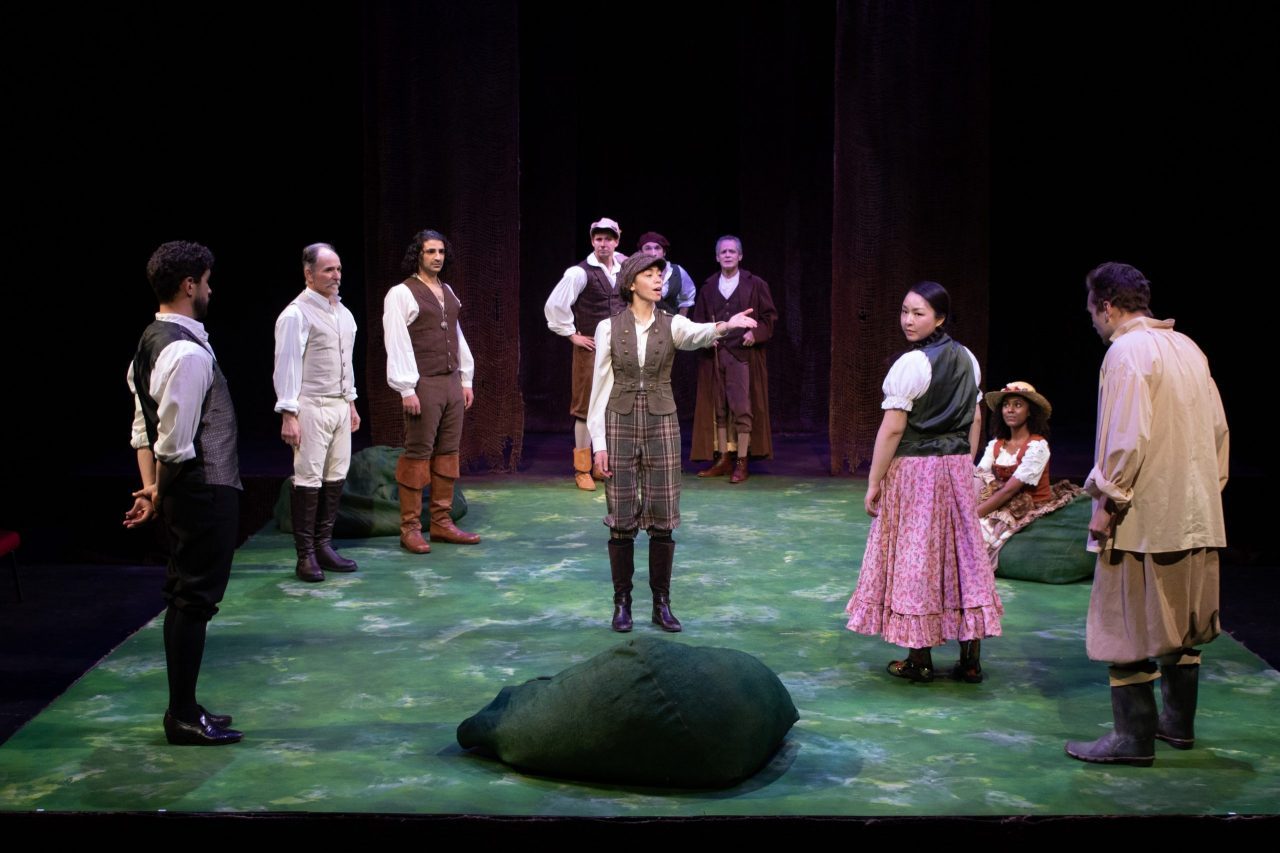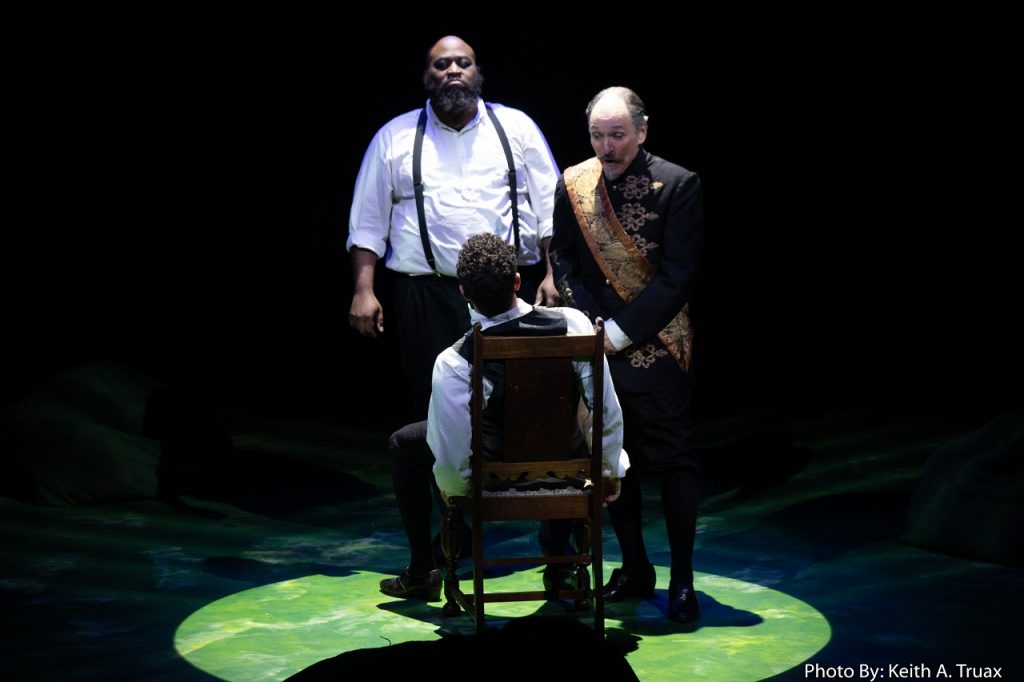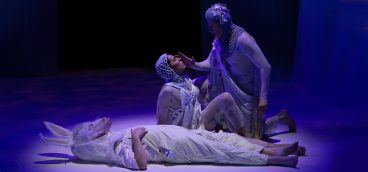PICT Emerges from the Darkness with a Brilliant “As You Like It”

It’s certainly more than a little ironic that the last play I reviewed before the pandemic shut down all the theaters nearly two years ago was a work by Shakespeare, set in a forest, and performed by PICT Classical Theatre in the Fred Rogers Studio at WQED. . . and now in reviewing the first indoor production after the pandemic, it happens to be a work by Shakespeare, set in a forest, performed by the same company, in the same space, and with many of the same actors.
In what might be the start of a labyrinthian story by Jorge Luis Borges, or a surrealist film by Luis Buñuel, one might ask, did PICT’s company get lost in the wilderness of last year’s “A Midsummer Night’s Dream” and end up wandering into the woods of this production of “As You Like It,” akin to the plot of a Borgesian tale? Or did we, as the audience, like the characters in a Buñuel film, find ourselves powerless to leave the theater then, becoming stuck here in the same seats all this time?
In either case, there is a magical quality about this show – perhaps something lingering from the set of Mr. Rogers’ Neighborhood of Make-Believe – that is part Shakespeare, part PICT, but the symbiotic product of both.
Written in 1599, the year before his unparalleled accomplishment “Hamlet,” “As You Like It” is the Bard’s most musical play, full of songs and mirth, and centered on a female protagonist. It couldn’t be more diametrically opposite from the tragedy that he would next create.

It’s usually better not to try to follow the plot too closely in Shakespeare’s romantic comedies, and instead concentrate on the action, which allows one to appreciate not only the fast pace of events, but also the scintillating language as it flies by. Here, we have the contrivance of a group of people who move from the city to the country, because of political machinations, and end up roaming around the Forest of Arden, where they can put on false appearances, pursue their loves, and encounter many eccentric characters, as this is where, of course, eccentric characters usually live – in pastoral settings.
Rosalind, the main character, played with acuity by Zoe Abuyuan, and Celia, her cousin, portrayed with depth by Saige Smith, end up disguised, the former as a man, which can be taken as a simple plot device, or the basis of a total reevaluation of gender in Elizabethan England, with major cultural implications for us today. You can evaluate this any way you like, or as you like it, to pun on the Bard’s proclivity for infinite interpretation, but one should realize that this is a female character as written on the page, played by a male actor in the theatrical convention of that time, who plays a female character disguised as a man. Again, if one simply sticks to the action, one will be more enthralled, and less confused.
Director Alan Stanford does not try to reinvent Shakespeare, as so many do today, but lets him speak to us in the manner of our age. One way he achieves this is with the brilliant conceit of contemporaneous accent, in this case, by imbuing the country folk with an unmistakable Appalachian twang. And this the actors achieve with a believable consistency. When I asked Stanford about this choice after the performance, he commented that “Yinzer accents work well in iambic pentameter,” so if you find yourself walking around the woods of Western Pennsylvania or West Virginia, you might consider running a few lines of such verse with the locals.

But in placing the bulk of this play in a rustic setting, Shakespeare, a strong poet, was satirizing the vogue of pastoral poetry endemic to his time. He does this hilariously through the character of Orlando (Gabe DeRose), who is so smitten with Rosalind that he walks through the forest, writing bad poems and literally posting them on trees, much like the Instagram poets of today insist on posting their awful poems online.
But beyond all the considerations of gender and social commentary, this is the work of a master playwright at the height of his powers, and “As You Like It” contains some of the strongest speeches not just in Shakespeare, but in all of drama.
Veteran PICT actor James FitzGerald, as Jacques, once again absorbs, and then becomes the character he is portraying with immeasurable nuance. His “All the world’s a stage” speech is revelatory in its lack of pretension: he delivers it to the audience as if he’s handing it a baby he doesn’t want to startle. Director Stanford also doesn’t try to hype the moment; he has characters entering and moving around as if to indicate that these words might be spoken by a living soul in real conversation, not an imaginary character extolling the klieg lights with platitudes.
Likewise, Martin Giles brings to his role of Corin the same brilliant execution; one can sense the faint conjuring of what will evolve into the character of Polonius in Shakespeare’s subsequent play.
Among the strong performances delivered by the entire cast is Dylan C. Wack’s ribald Touchstone the Clown, Sam Lothard’s Charles the Wrestler, and Sean Lenhart’s role as Adam.
Joan Markert’s costumes are particularly effective in evoking the demarcation between those characters born in the city versus those in the country. They don’t look like the usual dusty garb culled from back of the wardrobe department, but have the tailored authenticity crucial to establishing the fish-out-of-water motif of a bunch of urban sophisticates dashing about the woods in knickerbockers, like golfers looking for a ball lost in the rough, early in the 20th century.
Keith A. Truax and Kris Buggey provide the excellent modulations of light and sound, respectively, while director Stanford designed the existentially bare set — evoking the references to the rural environs as that of a “desert” – which an Elizabethan audience would find quite normal. Also crucial to the success of this show is the musical direction of Reed Allen Worth; if Shakespeare ever wrote a musical this would be it.
“As You Like It” marks the beginning of PICT’s 25th anniversary season, and should not be missed by anyone who loves Shakespeare, innovative theater, or romantic comedies. In fact, it would be appropriate for families, as well. Perhaps what PICT is really offering us is a way back from the darkness in which we have been lost for the past two years, wandering in the surreal isolation of our homes, like characters in a play with nowhere to perform, until now.
“As You Like It” continues through November 20th in the Fred Rogers Studio at WQED, Oakland, $20 – $48. 412-561-6000, or www.picttheatre.org










